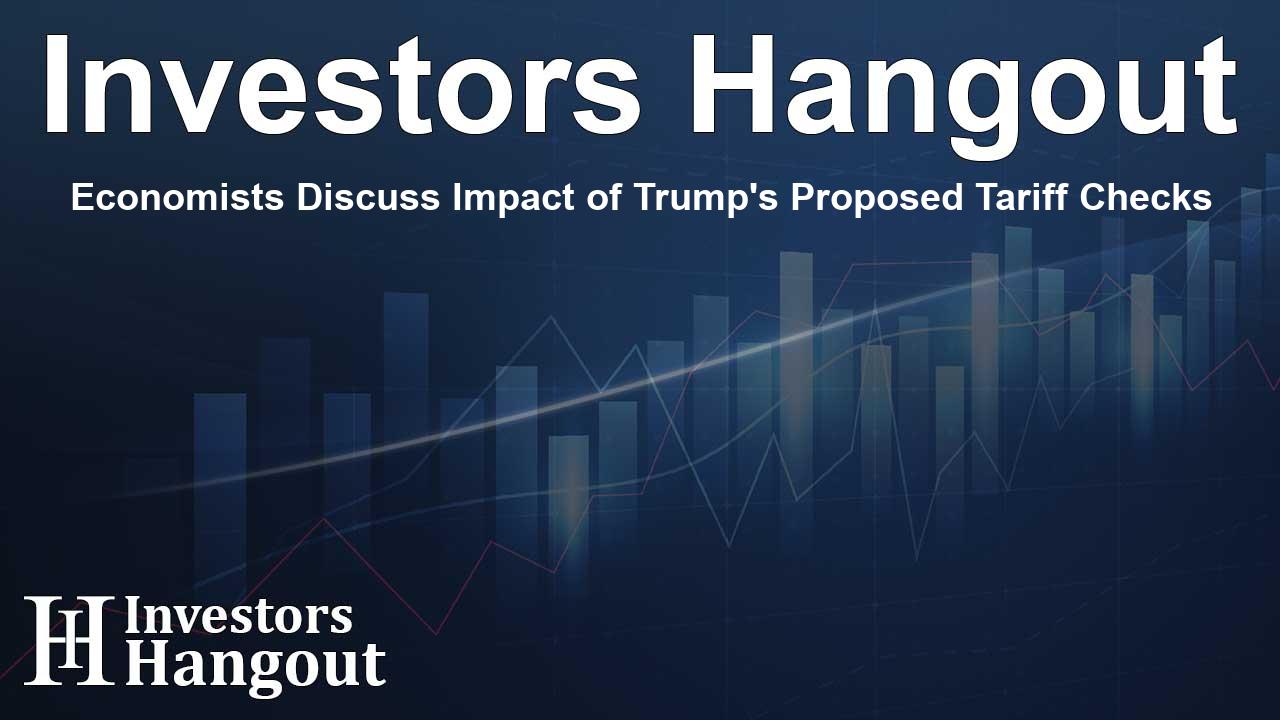Economists Discuss Impact of Trump's Proposed Tariff Checks

Proposed Tariff Checks and Economic Concerns
The potential introduction of tariff-revenue checks proposed by President Donald Trump has sparked considerable debate among economists. These checks, which might amount to between $1,000 and $2,000, are seen as a potential catalyst for increased consumer spending. This spending surge could lead to heightened inflation, a concern that is currently gripping economic minds.
Understanding the Economic Feedback Loop
Economists Highlight the Risks
Experts worry that these tariff-revenue checks could initiate what has been described as a "weird feedback loop." This scenario suggests that the financial aid from tariff revenue might incentivize businesses to pass higher costs onto consumers, thereby worsening inflationary pressures. Economists urge caution in applying these checks without realizing the broader economic implications.
Consumer Spending Dynamics
Chris Motola, a financial analyst at National Business Capital, remarked on the possibility of delayed inflation reports affecting the perception of these checks' impact. If inflation indicators trend positively, the checks may seem less inflationary. Nonetheless, an uptick in consumer spending could arise from these checks, which may counterbalance the economic strain inflicted by rising tariffs.
Similarities with Previous Stimulus Packages
The Influence of Past Stimulus
Paul Johnson, an adjunct professor specializing in value investing at Fordham's Gabelli School of Business, compared these checks to previous pandemic-era stimulus packages initiated during the Biden administration. He pointed out that the inflation-adjusted value of these checks would be diminished by the current high inflation rate, which has outstripped wage growth.
Public Perception of Tariff Checks
Johnson expressed skepticism about whether the recipients of the tariff checks would perceive them as "free money" or if they would be more inclined to save these funds instead. This insight reflects broader concerns about consumer behavior amidst shifting economic realities.
Government Response to Economic Criticism
A representative from the White House addressed the economic concerns raised by experts, arguing that many of these critiques stem from unproven assumptions surrounding speculative policies. The administration maintains that engaging with these forecasts requires a balanced perspective on potential outcomes.
Utilizing Tariff Revenue for Public Programs
New Directions for Tariff Funds
Historically, the Trump administration has been deliberating on the implementation of tariff rebate checks, financed by a significant surplus of tariff-generated revenue. However, recent discussions have shifted towards employing this revenue to bolster crucial nutrition programs aimed at supporting low-income mothers and children, especially during challenging socioeconomic times.
Criticism from Economic Experts
Despite this intention, not every analyst agrees with redirecting tariff funds toward rebate checks. Economist and gold advocate Peter Schiff criticized the proposal, calling it unwise. Schiff asserted that if politicians believe taxpayers deserve tariff revenue, they shouldn't impose tariffs that initially take that money from them.
Looking Ahead: The Broader Implications
The proposed tariff checks could have far-reaching effects on both consumer behavior and the economic landscape. As opinions continue to diverge among economists and officials alike, the conversation surrounding these checks will likely evolve, echoing concerns about inflation and fiscal responsibility.
Frequently Asked Questions
What are tariff-revenue checks?
Tariff-revenue checks are proposed direct payments to consumers funded by tariffs imposed by the administration, potentially ranging from $1,000 to $2,000.
How could these checks affect inflation?
Economists argue that the checks could stimulate consumer spending, contributing to higher inflation in the economy.
What concerns do economists have about these checks?
Many economists worry about the creation of a feedback loop, where tariff costs are passed onto consumers due to increased spending from these checks.
How does this compare to previous stimulus packages?
Comparisons have been made between these checks and previous stimulus packages from the Biden administration, particularly regarding their inflation-adjusted purchasing power.
What is the government’s stance on economic criticisms?
The White House has responded that many criticisms of the proposed checks are based on unsubstantiated assumptions about future economic policies.
About The Author
Contact Kelly Martin privately here. Or send an email with ATTN: Kelly Martin as the subject to contact@investorshangout.com.
About Investors Hangout
Investors Hangout is a leading online stock forum for financial discussion and learning, offering a wide range of free tools and resources. It draws in traders of all levels, who exchange market knowledge, investigate trading tactics, and keep an eye on industry developments in real time. Featuring financial articles, stock message boards, quotes, charts, company profiles, and live news updates. Through cooperative learning and a wealth of informational resources, it helps users from novices creating their first portfolios to experts honing their techniques. Join Investors Hangout today: https://investorshangout.com/
The content of this article is based on factual, publicly available information and does not represent legal, financial, or investment advice. Investors Hangout does not offer financial advice, and the author is not a licensed financial advisor. Consult a qualified advisor before making any financial or investment decisions based on this article. This article should not be considered advice to purchase, sell, or hold any securities or other investments. If any of the material provided here is inaccurate, please contact us for corrections.
